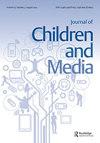How the COVID-19 shutdown revealed the effectiveness of a northern Nigerian educational media program
IF 2.1
3区 心理学
Q2 COMMUNICATION
引用次数: 0
Abstract
ABSTRACT A team of researchers were investigating the impact of a Nigerian adaptation of Akili and Me when the COVID−19 pandemic struck. Schools shut down, interrupting the study’s quasi-experimental intervention design. Post-school reopening, researchers recontacted 363 children (mean age = 5.1, SD = 1.1 years) who had provided data at baseline and had completed the intervention. The analyses revealed that during the shutdown, participating children watched Akili and Me, beyond the exposure experienced through the study intervention. Across viewing groups and including the control group, researchers found the children knew the program’s characters using a program receptivity score. The researchers found no differences associated with study’s initial group assignments. Those children who could name more Akili and Me characters performed significantly better on the outcomes of literacy, numeracy, shape, socio-emotional development, controlling for sex, age, baseline score, and group assignment. This study offers promising evidence that locally-produced educational media interventions can impact early learning skills, especially during a crisis when children rely on educational media for home learning. IMPACT SUMMARY Prior State of Knowledge Previous research conducted in low- and middle-income countries offers evidence that when exposed to educational and entertaining media, young children show significant albeit small improvements in their knowledge and skills related to literacy, numeracy, socio-emotional development, and health and hygiene. Novel Contributions Our original plan was to examine learning from media through a school-based study. In Nigeria, the government shutdown schools because of COVID−19; we used this interruption as an opportunity to capture children’s exposure to and impact of home-based viewing of educational media. Practical Implications Educational programs offering culturally-relevant content can affect preschool children’s learning of content and skills. If school interruptions happen because of manmade or natural disasters, governments can disseminate quality educational programming to enhance children’s learning while at home.新冠肺炎停摆如何揭示尼日利亚北部教育媒体计划的有效性
摘要2019冠状病毒病疫情爆发时,一组研究人员正在调查尼日利亚改编的《阿基利和我》的影响。学校停课,中断了该研究的准实验干预设计。学校重新开放后,研究人员重新接触了363名儿童(平均年龄 = 5.1,SD = 1.1 年),他们在基线时提供了数据并完成了干预。分析显示,在停课期间,参与的孩子们观看了《Akili and Me》,这超出了通过研究干预所经历的接触。研究人员发现,在包括对照组在内的观看组中,孩子们使用节目接受度得分来了解节目的角色。研究人员没有发现与研究最初的小组分配相关的差异。那些能说出更多Akili和Me角色名字的孩子在识字、算术、体型、社会情感发展、控制性别、年龄、基线得分和小组分配方面的表现明显更好。这项研究提供了有希望的证据,证明当地制作的教育媒体干预措施可以影响早期学习技能,尤其是在儿童依赖教育媒体进行家庭学习的危机期间。影响摘要先前的知识状况先前在中低收入国家进行的研究提供了证据,表明当接触到教育和娱乐媒体时,幼儿在识字、算术、社会情感发展以及健康和卫生方面的知识和技能有了显著但微小的进步。新颖的贡献我们最初的计划是通过一项基于学校的研究来研究从媒体学习。在尼日利亚,政府因新冠肺炎关闭了学校;我们利用这次中断来捕捉孩子们在家观看教育媒体的机会和影响。实践意义提供文化相关内容的教育项目可能会影响学龄前儿童对内容和技能的学习。如果学校因人为或自然灾害而中断,政府可以传播高质量的教育节目,以提高儿童在家的学习能力。
本文章由计算机程序翻译,如有差异,请以英文原文为准。
求助全文
约1分钟内获得全文
求助全文

 求助内容:
求助内容: 应助结果提醒方式:
应助结果提醒方式:


